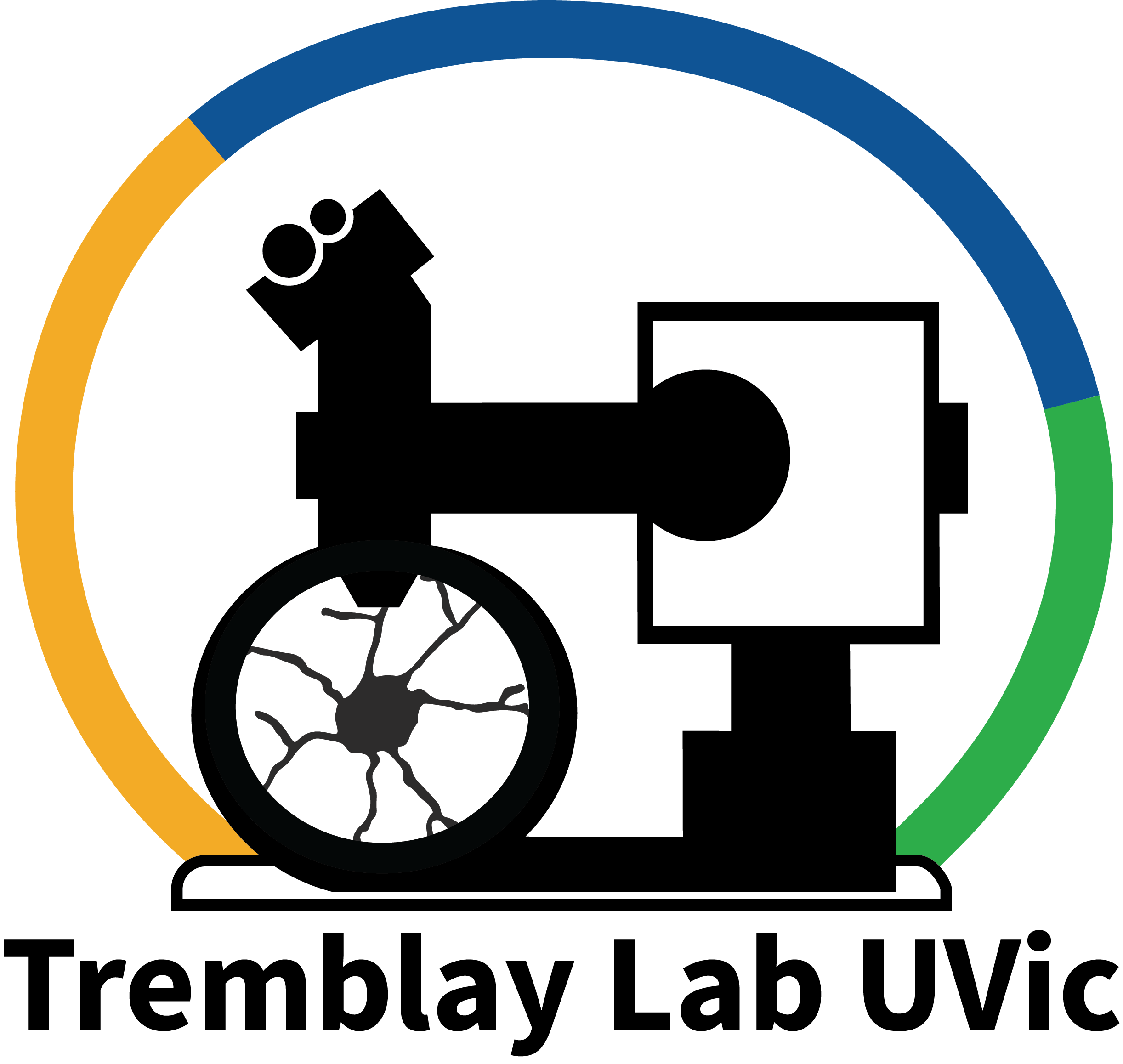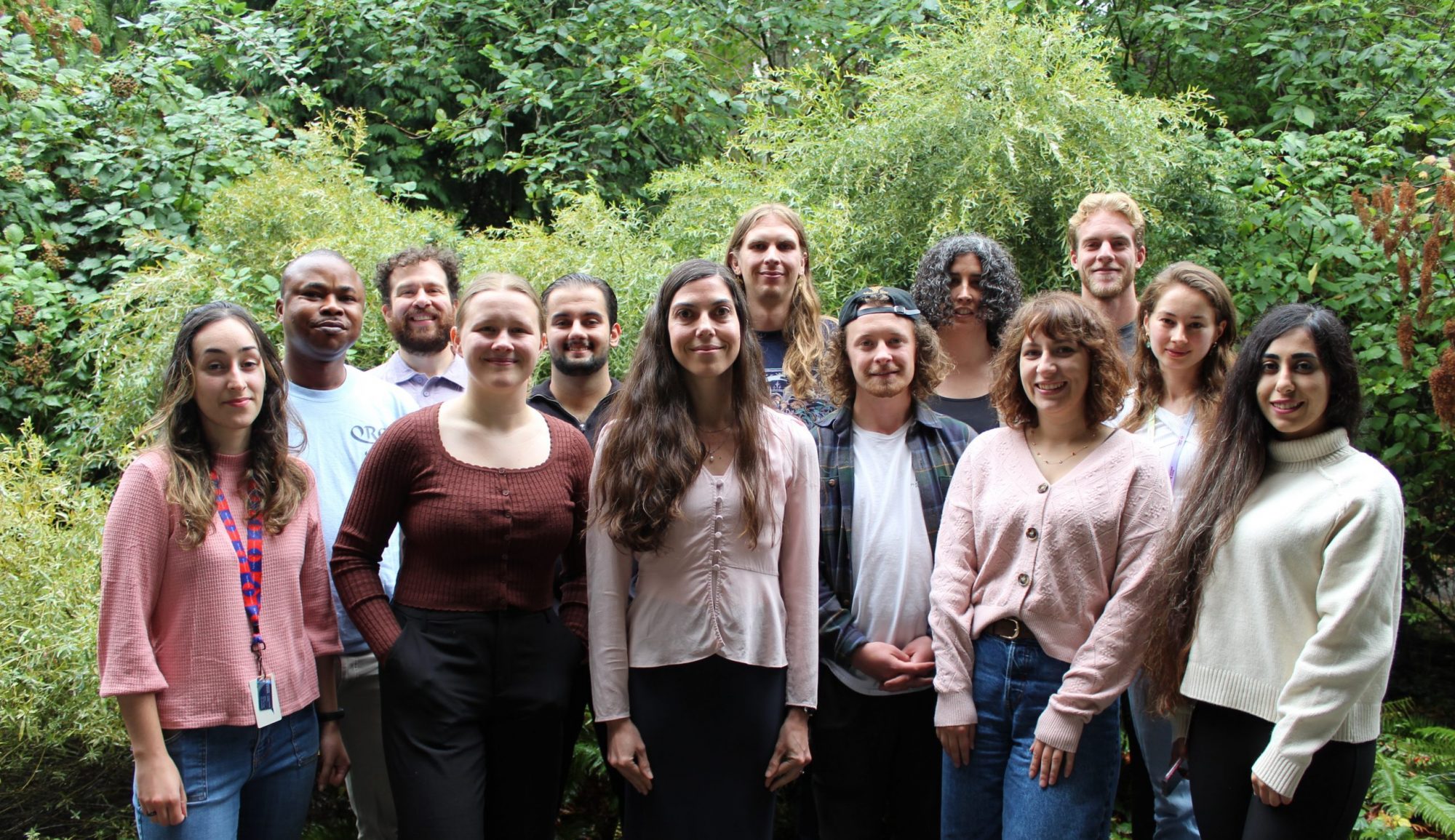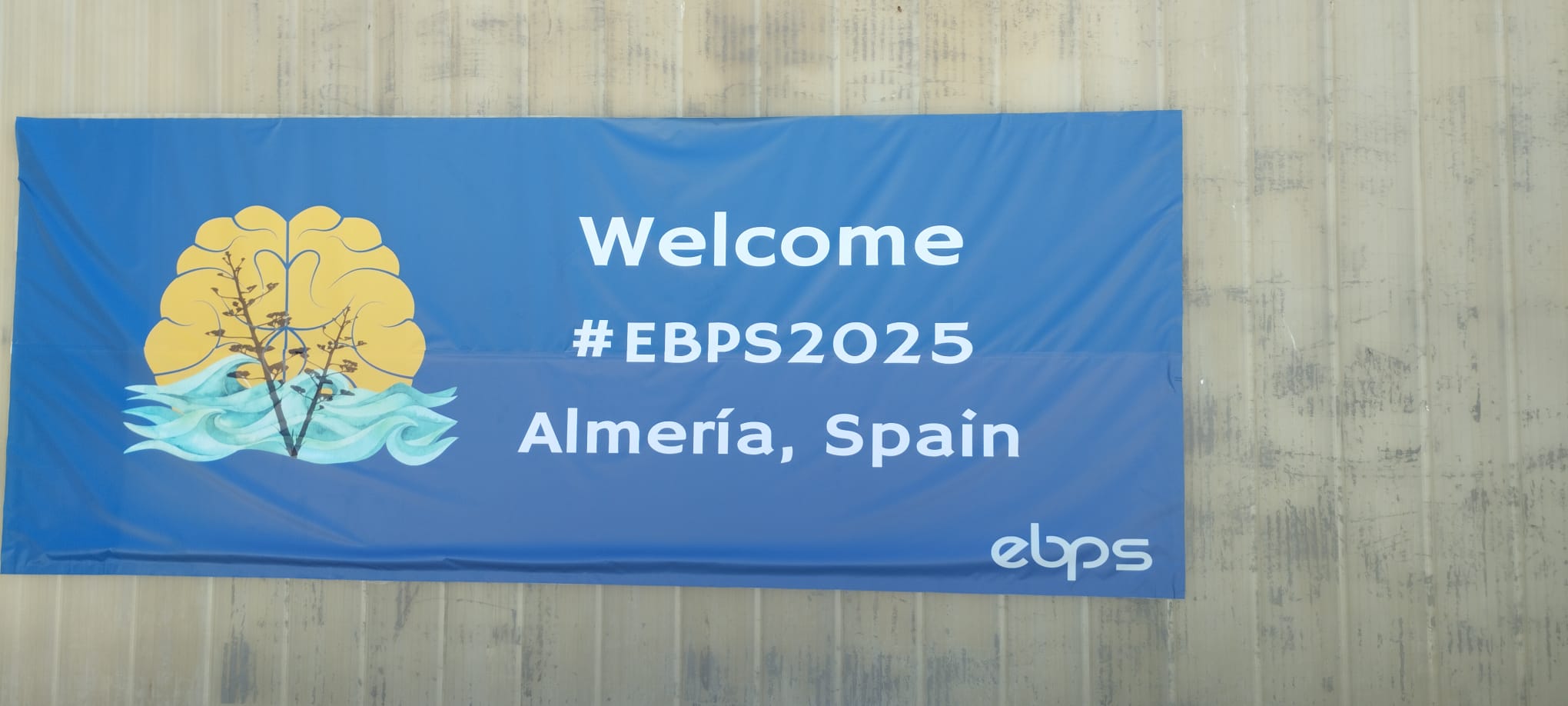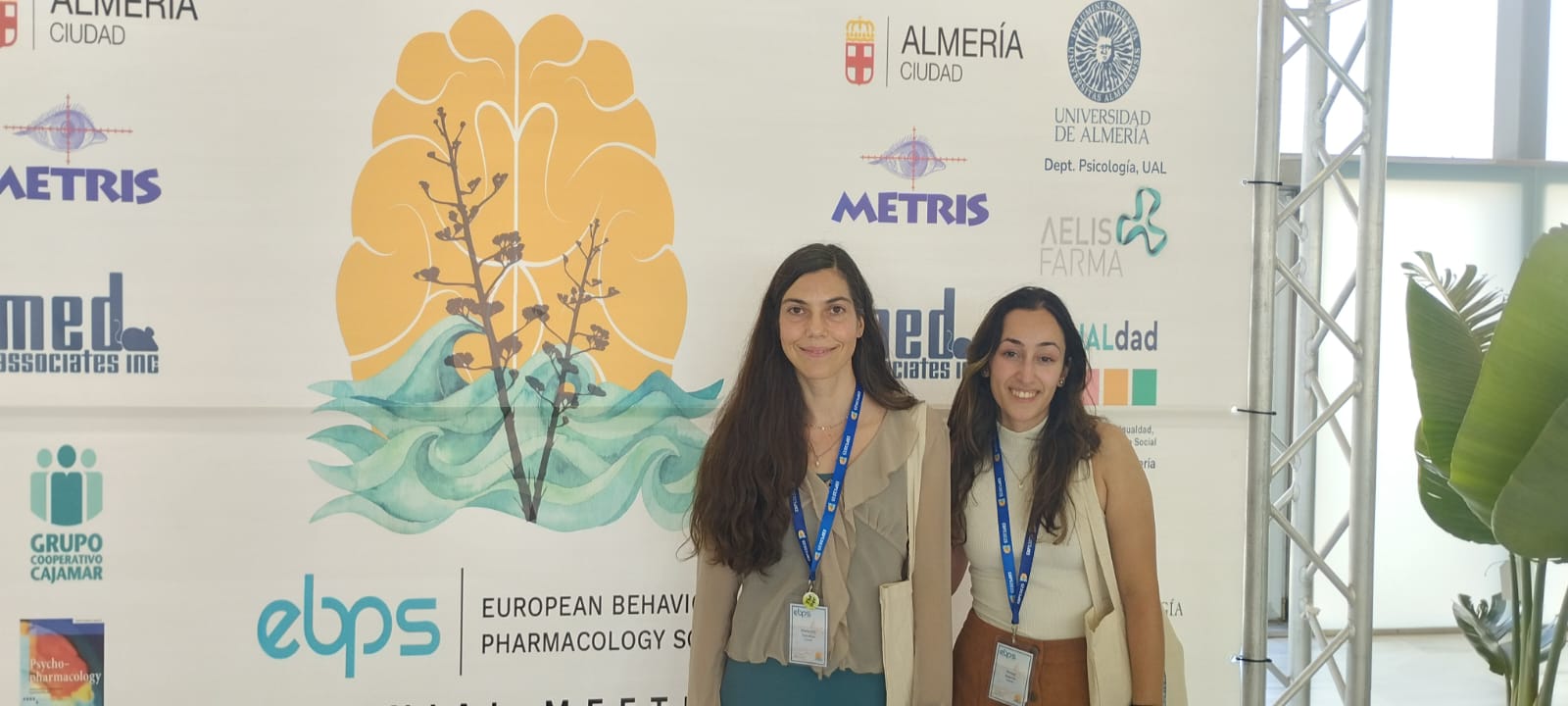We acknowledge and respect the Lək̓ʷəŋən (Songhees and Xʷsepsəm/Esquimalt) Peoples on whose territory the University of Victoria stands, and the Lək̓ʷəŋən and W̱SÁNEĆ Peoples whose historical relationships with the land continue to this day.
A series of discoveries spanning the last decade has challenged our view of microglia, the brain’s innate immune cells, showing their essential but previously unexpected contribution to the remodelling of neuronal circuits. In this emergent field of investigation, research in Dr. Marie-Eve Tremblay’s laboratory at the School of Medical Sciences, University of Victoria, aims to determine how this newly-defined mechanism could be implicated in the loss of neuronal connections that best correlates with the impairment of learning and memory across major depression, schizophrenia, aging, and neurodegenerative diseases.
The goal of our research is to design novel therapeutic strategies that specifically target microglia to promote brain resilience and healthy cognitive functions along the aging trajectory. We thereby aim to prevent and treat major depressive disorder, schizophrenia, and the highly prevalent sporadic forms of neurodegenerative diseases including Parkinson’s and Alzheimer’s disease.

Mouse brain microglia in 63x seen from a confocal microscope
Iba1 is seen in red and DAPI in blue
Taken by Bianca Bobotis

Mouse brain microglia seen from a scanning electron microscope
Purple outline = nuclear membrane, green outline = plasma membrane, orange asterisk = mitochondria, blue asterisk = endoplasmic reticulum/Golgi apparatus, red asterisk = empty phagosome, red arrow = myelinated axon, 3rd = tertiary lysosome, orange pseudo-coloring = pre-synaptic terminal, blue pseudo-coloring = post-synaptic terminals.
Taken by Mohammadparsa Khakpour
Featured:
September, 2025
Dr. Marie-Ève Tremblay selected as a new delegate from the Science Meets Parliament (SMP).

The Canadian Science Policy Centre in partnership with Canada’s Chief Science Advisor Dr. Mona Nemer is pleased to announce the Delegates for the 2025 Science Meets Parliament program.
Among the Faculty Members applications all across Canada, Dr. Tremblay was selected, representing Vancouver Island and the University of Victoria.
This is a great step that will allow parliamentarians and legislative assembly members to explore how scientific evidence can inform their work and to help scientists understand political processes.

August 19-22, 2025
Microglia and sex differences in New York!

Our doctoral student, Eva Simoncicova, M.Sc. and our post-doc Fernando González Ibáñez, PhD. will attend ISN-ASN 2025 conference in New York City (USA) on August 19-22. We congratulate Eva for winning a ISN Travel Award to attend this meeting.
Eva will present on the: Characterization of sex differences in cognitive performance and microglial function after an inflammatory stimulus in the ventral hippocampus of aged C57BL/6J mice.


Recent Activity
The Tremblay lab at the European Behavioural Pharmacology Society (EBPS) – Almería, Spain
Happening in Almería, Spain from September 17th to 20th, Dr. Marie-Ève Tremblay and Bianca Bobotis, the lab manager attended the EBPS conference.
While Bianca had a poster presentation about how sex chromosomes and sex hormones shape microglial properties, Dr. Tremblay gave a talk about the outcomes of cannabinoids and psychedelics on microglia.
The poster and talk were super well received, receiving lots of positive feedback.
A new lab logo! Tremblay lab members enter a contest to create the newest lab identity
The Tremblay lab has been active for over a decade. This year, we decided to incorporate our expertise into a new logo. The lab manager, Bianca Bobotis, decided to create a contest where the lab members could express, with art, their perspective of the lab.
The anonymous voting took place on May 14th, 2025. In total, 5 lab members entered super creative and well-designed logos, including Eva Šimončičová, Dr. Fernando González, Jackie Dunn, Mohammadparsa Khakpour and Bianca Bobotis. After the voting period, the finalists were set: Bianca and Eva. After a careful look, Dr. Tremblay announced the winner.
Dr. Tremblay mentioned: “This was a very difficult decision, as I enjoyed a lot the different options and thought they each brought an interesting perspective to our lab’s focus! Considering my goal of prioritizing our microscopy expertise across modalities and the common interest of our projects in studying cells (with microglia being one of our favourite types…), I propose to go with Eva‘s design”.
After a few tweaks, we are proud to announce our new logo:

The Tremblay lab hosts Dr. Flavia Saravia as part of the Seminar Series in the Neuroscience Graduate Program at the School of Medical Sciences, UVic
Dr. Flavia E. Saravia, a Principal Investigator at CONICET in Argentina, joined us on Friday, July 25, 2025, to give a seminar as part of the Neuroscience Graduate Program seminar series at the School of Medical Sciences.
The day began with a lab tour led by Bianca Bobotis and Colby Sandberg, along with our PI, Dr. Marie-Ève Tremblay, who introduced Dr. Saravia to our facilities. Jared VanderZwaag, one of our PhD candidates, provided an overview of our scanning electron microscopy (SEM) work.

Following great conversations and exchange of ideas, Dr. Saravia gave an inspiring talk on the potential of galectins as therapeutic targets for Alzheimer’s disease.
We concluded the day with the student luncheon with the professor and the presentation by Eva Šimončičová, another of our PhD candidates, who shared her recent findings on aged mouse microglia.

Shaping Mental Health Futures at UVic
Presented by UVic’s Mental Health Research Cluster (MHRC) team: Dr. Marie-Ève Tremblay (DMS, UVic), Dr. Hector Caruncho (DMS UVic), Anja Lanz (UBC), Ashleigh Enright (IALH, UVic), Bianca Bobotis (DMS, UVic), Dr. Benneth Ben-Azu (DMS, UVic), Karinna Vasquez Castro (DMS, UVic)
Last Friday, February 28, 2025, the University Club of UVic hosted the 3rd workshop of MHRC, bringing together a diverse group of trainees, professors, academic staff, mental health professionals, community partners and people with lived-in experience, for a day of presentations and collaborative discussions. Following the opening by Dr. Tremblay, Dr. Skip Dick, a Songhees Nation elder, joined the workshop for the territorial acknowledgment and inspiring speech about the importance of individual’s roots, identity and sense of belonging. The second invited speaker, Ryan Douglas, a therapy designer and co-founder of DeepWell DTx, explored the potential of accessible, easy-to-use and affordable non-pharmaceutical technological approaches to enhance the mental health and their commercialization, such as are online games, introducing the concept of ‘gamify-ing medicine‘. Lastly, Dr. Shawn Whitehead, director of Western Institute for Neuroscience (WIN) at Western University (London, Ontario), discussed the importance of tackling mental health problems through an interdisciplinary lens perspective.

Afternoon round-table discussion provided space for all participants to discuss the aims and principles of the budding Graduate Program in Neuroscience and Mental Health, Faculty of Health as well as Mental Health Research Center, particularly focusing on the role of community and its needs. Leading this initiative at UVic are Dr. Tremblay and Dr. Caruncho who aim to establish and foster innovation and interdisciplinary collaboration that will open novel opportunities in the field of mental health.


More information will be available in future at: (MHRC website in preparation)

Written by: E Simoncicova, B Bobotis
CAPI Research Forum
On October 4th, 2024, at the University of Victoria, Dr. Marie-Ève Tremblay, Dr. Fernando González Ibáñez (postdoctoral fellow) and Parsa Khakpour (research associate) represented the Tremblay lab at the Asia Forum organized by the Center for Asia-Pacific Initiatives (CAPI).
CAPI is a research centre focused on research, education and community engagement in the Asia-Pacific. As part of the ASPIRE grant, The Tremblay lab has important collaboration with research teams in Japan. During their participation in the Asia Forum, Dr. Tremblay presented a talk titled “Studying the Brain Immune Cells to Promote Healthy Cognitive Aging” followed by a talk on electron microscopy by Dr. González Ibáñez titled “Advanced Electron Microscopy Imaging for Ultrastructural 3D Models in Neuroscience”.
See also https://www.uvic.ca/research/centres/capi/index.php

“In preparation for our newly received ASPIRE grant that supports Canada-Asia research collaboration and focuses on training of young researchers through exchange, it was particularly useful to learn more about the approaches of our Asian researcher colleagues across various research fields. In that manner, this meeting provided excellent grounds for further networking and identification of various support resources within UVIC, both areas necessary for future collaborations.” (Dr. González Ibáñez, October 15, 2024)
Written by: FG Ibáñez, E Simoncicova
Celebrating 🎓

Fernando González had his convocation at the Université Laval, where he earned his Ph.D. title in the Molecular Medicine program. He is currently a postdoctoral research fellow in the Tremblay lab who is supported by a BC Health Michael Smith postdoctoral research award.
Centre de Congrès, Ville de Quebéc
June 23, 2025

Bianca Bobotis had her convocation at the University of Victoria, where she earned her M.Sc. title in the Neuroscience program. She has also taken over as the Lab Manager in the Tremblay lab.
University of Victoria
June 11, 2025

Antonia Landwehr, a graduate student, successfully transferred from M.Sc. to the Ph.D. program.
University of Victoria
May 4, 2025

Sophia Loewen, a graduate student successfully defended the thesis titled: “Maternal immune activation and sex modulate hippocampal microglial properties in developing mice and result in behavioral changes in adult mice”, earning the title M.Sc.
University of Victoria
March 04, 2025
Latest publications
Bobotis et al. (2025) Journal of Neuroinflammation: Sex chromosomes and sex hormones differently shape microglial properties during normal physiological conditions in the adult mouse hippocampus
Flury et al. (2025) Neuron: A neurodegenerative cellular stress response linked to dark microglia and toxic lipid secretion
Murray et al. (2025) Glial Health Research: A comparison of microglial morphological complexity in adult mouse brain samples using 2-dimensional and 3-dimensional image analysis tools
Updated and maintained by Bianca Bobotis, 2025.













